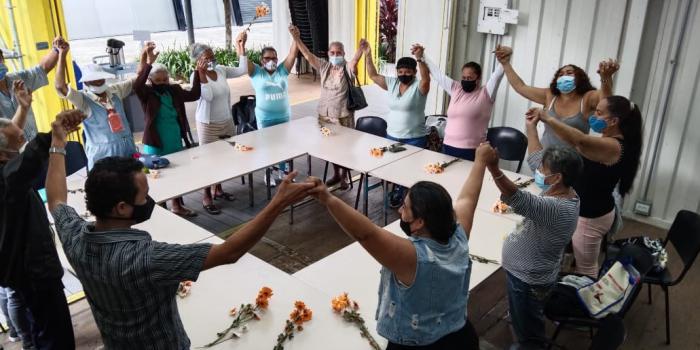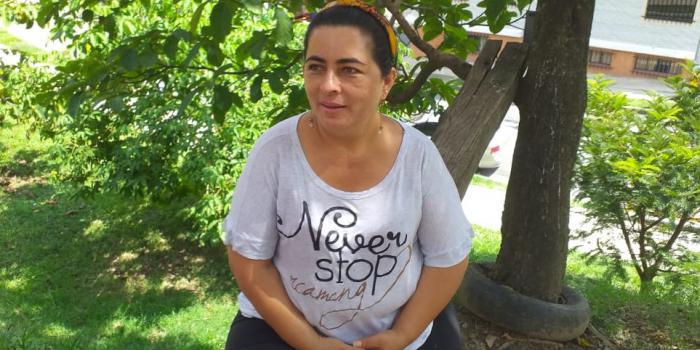
In a loving manner, Isela Quintero teaches people to place themselves in the conflict victims’ shoes
This woman from Antioquia seeks to sensitize those who have not experienced war in their own flesh, so they understand how empathy can be the key to non-repetition.


By: Vannesa Romero
Who didn't wear mommy's heels to pretend to be grown up? Or who didn't wear daddy's ties to play as an office worker? Ah! Those times when life was so different ... "I loved to put on my mother's and sister's shoes, I loved to wear their earrings and everything they used." This phrase is spoken by Isela Quintero with a smile on her face, a woman from Antioquia who knows first-hand what it is to overcome life’s hard blows.
She was born in the land of the chief Cocorna, the municipality that currently bears the name of this historical figure and where she spent the best moments of her childhood, that place “where one grows up in a family where everything is love, where everything is understanding, where everything is dreaming to progress together.”
She led actions that benefited her people in with a group, but those actions were stopped by other people's war that increased in the territory and affected not only her family, but the entire community because she carried out social work that was marking history.
“When a leader or an activist is touched by the armed conflict, it not only affects him, but it also touches all those people with whom he gathered. I think the hardest thing about this is how to pick up what's left of the ashes to rebuild it. It's like when you have a card castle and suddenly it is falling apart, and you are looking slowly, and it is falling. It is the same when one lives the armed conflict.”
Working together
This woman, who considers herself a full-time dreamer, had to move to Medellin in search of that peace it was taken from her. She is part of the Medellin’s Victims Municipal Board and has worked hand in hand with the Unit for the Victims for the well-being of other women who have gone through similar situations. But her arrival was not easy, the difficulties of foreign lands confronted her with her essence. “In the beginning, when you arrive to a completely strange city, completely different for its culture and customs, it isn’t easy at all. One comes with a heavy load, with a backpack full of memories, full of fear, full of hopelessness.”
In the same manner that to access benefits from the Unit for the Victims there has always been a link, the Municipal Victims board, "we have also been heard from other spaces where we have participated."
On her journey she has run into women who, like her, have had to fulfill several roles at the same time: father, mother, teacher, house provider, authority and confidant, just to name a few, and that work has allowed her to understand that these kind of women have rights, they have voice and vote regarding peacebuilding and “when one begins to talk with other people, one understands one has rights, and that the State must repair and reestablish them. So, I think when you understand and realize this, you begin to request restauration of those rights infringed in the internal armed conflict. "
Kindness strategies
This is how a proposal was born, that through activities based on love and empathy, there was the chance to create awareness in those who have not been touched by the war. “To place oneself in other people’s shoes, that the citizens live this conflict directly or indirectly. If a part of society hasn’t been affected by the armed conflict, then how can they understand it, in what way can others be that support for those who have been affected like us and who today still live in the armed conflict. What guarantees us that this cannot happen to anyone?”
The proposal "Place yourself in my shoes" was implemented this year by her and a group of women in Medellin’s main square, where they symbolically generated awareness, to make passersby understand for a moment what people like her have had to go through: "A peasant woman, and a human rights defender who has lived through the armed conflict." That is why her message is clear: “Today we want to tell society, we want to invite institutions, and tell the entire community, to place ourselves in the shoes of those who have experienced this violence. In addition, we have been transferring these activities to another stage where we can be builders.”
“I dream a lot and my hope is to leave a story behind, so what I had to live because of the armed conflict doesn’t happen to anyone else, especially the young people I work with, because when one doesn’t let dreams to be taken away, everything can become a reality. That is why I consider myself a butterfly, because butterflies begin to grow, and it is a slow process to be able to fly," says Isela, remembering that the seed she is sowing can grow in each person who reads these lines, that each witness of her story can place themselves in the victims’ shoes and create change actions to live in peace.
(End/PVR/COG/RAM)






